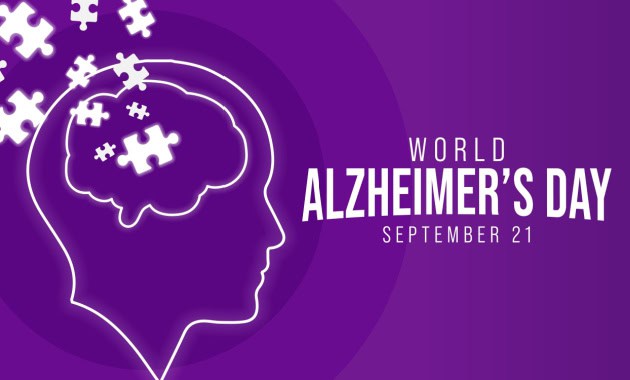
World Alzheimer’s Day is observed every year on the 21st of September across the globe to raise awareness about the misconception about dementia and Alzheimer’s. Alzheimer’s disease causes the brain to shrink, resulting in a continuous decline in memory, thinking ability, and social skills.
Alzheimer’s disease is the most common type of dementia (loss of memory, language, and other thinking abilities) and contributes to 60-70% of cases [1].
There are over 55 million people worldwide living with dementia in 2020 and this number will rise around by 139 million by 2050.
Therefore, to tackle Alzheimer’s disease, creating awareness among the masses and cultivating crucial knowledge on Alzheimer’s warning signs and symptoms, can help people to lead a healthy lifestyle [2].
The symptoms gradually turn severe over the years. The disease is most common in people over the age of 65 years [3]. But in a few hundred families worldwide, early onset of Alzheimer’s disease is also seen usually in their 30s caused by deterministic genes, and many family members in multiple generations are affected [5].
The disease got its name from a German Psychiatrist, “Alois Alzheimer” who first discovered it while treating a lady in 1901.
10 Warning Signs And Symptoms Of Alzheimer’s Disease
Whether you are distressed for yourself or someone you care about, it’s important to know the warning signs of Alzheimer’s disease to ensure an early diagnosis. Here are 10 of the most common warning signs for Alzheimer’s:
1. Memory Loss That Disrupts Day-To-Day Abilities
One of the most common signs of Alzheimer’s disease, particularly in the early stage, is forgetting recently learned information. The person might need to rely on reminder notes or family members for things they used to handle on their own.
2. Challenges In Solving Problems
Some people living with changes in their memory due to Alzheimer’s may experience changes in their ability to work with numbers. They may take much longer to manage household finances or bills.
3. Problems With Language
A person affected with Alzheimer’s may find it difficult to express what they want to say. They may easily forget simple words or may substitute words in between sentences.
4. Confusion With Time, Date, Or Place
Some people can lose track of dates and the passage of time. Sometimes they may face problems knowing the day of the week or becoming lost on their street, not knowing how to get back home.
5. Changes In Mood And Behaviour
One of the signs that a person encounters is varied mood swings from confusion, suspicion, depression, fear, or anxiety. Individuals can easily lose their calmness at small things, whenever they come out of their comfort zone.
6. Misplacing Things And Not Able To Recall
Individuals living with Alzheimer’s may put things in unusual places. They can temporarily misplace things like wallets, or keys and be unable to retract them again.
7. Withdrawal From Work And Activities
Another noticeable sign is changes in the ability to hold a conversation and the mood shifts off the work. As a result, the person may start withdrawing from hobbies, or other engagements.
8. Difficulty In Completing Familiar Tasks
People living with memory changes from Alzheimer’s often find it hard to complete daily tasks. They may forget to do household chores like preparing a meal, making a grocery list, or even driving to a familiar location.
9. Problem In Understanding Visual Images
Those with Alzheimer’s challenges may find it difficult to determine color or contrast. They could experience vision changes with time and hence, issues with driving a vehicle.
10. Changes In Personality
Any individual’s personality changes over time. However, a person with Alzheimer’s may experience more evident personality changes and can become confused, or withdrawn. Changes may include a lack of interest in his/her favorite activity.
If any individual notices any of the warning signs listed above in yourself or others that are not normal, the next step is to talk to the doctor. It’s very natural to feel unpredictable, and nervous about discussing these changes with others. However, proper evaluation, tests, and early detection an important steps to figuring out and taking action on what’s going on.
Get Yourself Checked As Early Detection Matters
Consult India’s best doctors here
(The article is written by Simran Suri, Assistant Team Lead, and reviewed by Monalisa Deka, Senior Health Content Editor)
References
1. Dementia. Key Facts. World Health Organization (WHO). [Updated 2023]
Available From: https://www.who.int/news-room/fact-sheets/detail/dementia
2. Dementia Statistics. Alzheimer’s Disease International. [Updated 2020]
Available From: https://www.alzint.org/about/dementia-facts-figures/
3. Overview. Alzheimer’s Disease. National Health Services (NHS). [Updated 2021]
Available From: https://www.nhs.uk/conditions/alzheimers-disease/
4. Kumar A, Sidhu J, Goyal A. Alzheimer’s Disease. National Library of Medicine (NLM). [Updated 2022]
Available From: https://www.ncbi.nlm.nih.gov/books/NBK499922/
5. Younger/Early-Onset Alzheimer’s. Alzheimer’s Association. [Updated 2023].
Available From: https://www.alz.org/alzheimers-dementia/what-is-alzheimers/younger-early-onset